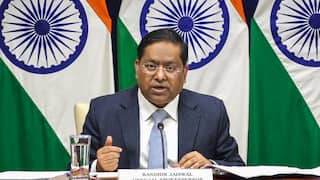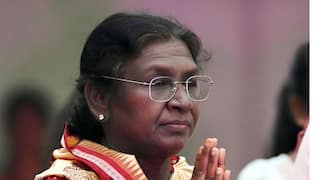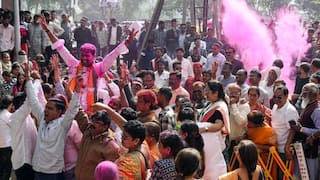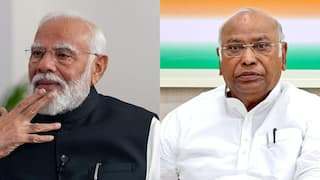Flashback Friday: Revisiting Damini A Pathbreaking Feminist Film That Owns Its Cult Status
The last ten years have seen a glut of feminist films, some of which even overuse the subject while nevertheless offering some seriously questionable themes.

Why Damini is this week's pick
- Manoj Bajpayee's Bandaa, that released this week, started a discussion about Bollywood courtroom dramas, particularly those that focus on women. Damini is one such movie you can't skip when talking about the subgenre.
New Delhi: 'Damini', a feminist cult favourite among Bollywood movies, is a film that no one from the '90s era could possibly forget. You must be acquainted with Sunny Deol's famous dialogues, 'tarikh pe tarik' and 'yeh dhai kilo ka haath...,' owing to memes, even if you are unfamiliar with the period when Hindi cinema came up with a few worthy films amidst the redundant ones. These are from the aforementioned Meenakshi Seshadri-starring film, which not only garnered rave reviews but also rose to become the sixth highest-grossing movie of 1993. Although the movie deserves greater credit for its boldness than for including Deol's claim to fame dialogue, it was unfortunately released at a time when its main selling point—a risque attempt at a women-centric movie—was hardly acknowledged.
The last ten years have seen a glut of feminist films, some of which even overuse the subject while nevertheless offering some seriously questionable themes. However, there were ground-breaking films like 'Ankur', 'Kamla Ki Maut', or 'Astitva' that shattered societal taboos and sensitively addressed issues of society before the sub-genre of cinema was even known to a wider audience. Speaking of Damini, there were just two heroes in the movie—we're not referring to Rishi Kapoor and Sunny Deol—Meenakshi and the tight bound screenplay, which was written by Rajkumar Santoshi and Sutanu Gupta.
The movie's title, which literally translates to 'lightning', is a fitting depiction of how the main protagonist goes on to confront society's hypocrisy throughout the course of the narrative. The movie opens with a guy-meets-girl tale, sticking to the tropes of the then-common norm in cinema. At first sight, Damini, a young woman from a humble family, captures the attention of Shekhar Gupta (Rishi Kapoor), the son of a powerful businessman. But unlike the typical love interests in such films, she is shown to the viewers as a woman with distinctive thoughts and morals.
With her honesty, she wins over both her soon-to-be spouse and her in-laws. And everything is perfect until the same trait turns out to be the greatest threat to them. She witnesses the domestic help, Urmi, being gang-raped by her brother-in-law and his pals, and she makes the hard choice to battle against all the odds to bring the oppressed woman justice. Just before the incident occurs, Damini clearly tells them to stop trying to forcefully apply colour to Urmi when she clearly seems uncomfortable. A subtle but pivotal hint about the worth of consent, rarely seen in old films.
Damini's decision exposes her to the hypocrisy of people, especially those with money and influence, who choose to trade the life of an innocent woman for a family member, despite being aware of his hideous crime. The family conceals what happened by saying that Urmi wasn't at work on the day of the rape, and Shekhar pushes Damini to lie. When she sees the true faces of those desperate to uphold their standing in society, a lengthy war begins that she is oblivious to. Although the film relies extensively on melodramatic sequences and has no way to steer clear of clichéd dialogue, what is noteworthy is its attempt to spell out bias.
Damini is frequently seen challenging cultural norms that reduce women's value to nothing. She confronts her spouse in a scene and asks him how to wipe out her own conscience so it won't bother her with the truth. The storyline shifts in the second half of the movie, as the protagonist is pushed to the brink of breaking. Damini is deemed mentally unfit following a distressing questioning held in court by the defendant's attorney, Indrajith Chadha (Amrish Puri). The entire courtroom scene, which undoubtedly features a yelling lawyer and a sobbing witness, is nevertheless moving.
Bollywood typically focuses on the male character through a saviour narrative while bringing out the stories of the women. Case in point: Govind, the alcoholic lawyer played by Sunny Deol in the movie 'Damini', steps in to save the day. Although Sunny Deol won a Filmfare and a National Film Award for Best Supporting Actor for his performance in the movie, we'll reserve our admiration for him for another day.
Meenakshi's performance, which is incredibly emotional and every now and then gives you goosebumps, will take centre stage today. The treatment of the female lead is one of the many ways that the movie is ground-breaking. Even with an ensemble cast, the actor is given a shot to stand out and deliver one of her finest performances. Meenakshi draws in viewers from the intense beginning scene in which she is frantically seeking refuge across a building's hallways to the final scene in which she delivers a compelling monologue and lets go of all her shame to expose the truth.
'Damini', a film that falls under the feminist cinema genre, could look dated in comparison to the more nuanced films Bollywood has to offer nowadays, like 'Pink' or 'Raazi'. One must watch the movie while bearing in mind that it set out to tackle a subject that was exceptional for the silver screen at the time when rape simply served as a catalyst for the male protagonist to turn into a messiah. And didn't fail us.
ALSO READ: Flashback Friday | Manichitrathazhu: Mohanlal-Shobana Masterpiece That Withstood The Test of Time






































